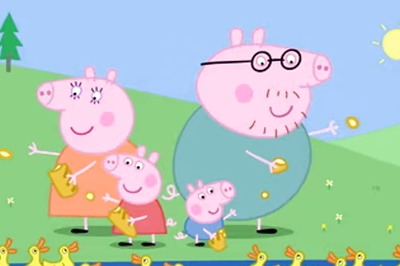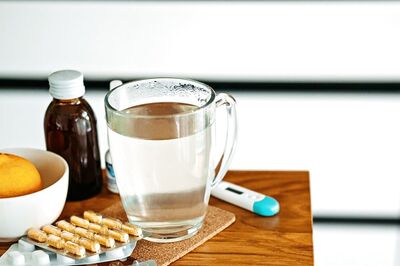
views
Healthy Hair Washing Habits

Wash your hair less frequently. People often make the mistake of thinking that they need to wash their hair every day, but washing hair too often can actually dry hair out, or weigh it down with product. For most people, washing your hair twice a week is adequate. The longer, thicker, curlier, and more processed your hair, the longer it can go between washes. If your hair gets oily very quickly and you must wash it every day, use a lightweight or "every day" shampoo, as these contain milder detergents than others. Alternately, you can try soap nuts or use dry shampoo in between regular washes.

Always use conditioner. Always use a good conditioner after you shampoo. The conditioner will provide moisture for your hair while making it softer and more manageable. It will also make your hair easier to brush out after the shower, thus causing less damage. Only apply conditioner to the ends and mid-lengths of your hair, otherwise your hair will look greasy. Use a leave-in conditioner at least once a week. Leave-in conditioners penetrate deep into your hair cuticles to heal them more completely. Try using a leave-in conditioner spray after you shower. The spray will make your hair more pliable and easier to detangle. Every so often, try using a deep conditioning treatment. You can use deep conditioning treatments like olive oil, argan oil, avocado oil, or coconut oil.

Use a wide-tooth comb to detangle after washing, not a brush. Wet hair is more susceptible to damage than dry hair, it is more elastic and more likely to break. Since hair is most fragile when it's wet, you shouldn't rip a brush through it after washing. Instead, you should spray some detangler on it, and then use a wide-tooth comb to remove tangles and minimize breakage. Remember to start from the ends up, not from the roots down. Once hair is dry, avoid unnecessary brushing, combing, or handling. Using your fingers to comb through your hair while wet can cause damage and hair loss. Make sure to wait until after your shower to comb out any tangles.

Don't towel dry your hair. As hair is more fragile when wet, roughly towel-drying hair can cause damage. Rubbing wet hair with a towel can rough up the cuticle (outer layer of the hair), causing more breakage and leading to frizzy or fluffy hair. Instead of rubbing, try blotting your hair with a towel to remove excess moisture. Invest in a super absorbent towel, such as one made of microfiber, that you can wrap around hair after washing.

Use a hair dryer sparingly. Frequent use of a hair dryer can dry out hair, causing breakage and split ends. Try to limit your use of a hair dryer as much as possible, let your hair dry naturally instead. If you do use a hair dryer, don't hold it too close to your hair, as this will cause your hair to burn. Always apply heat protection spray or serum to the hair before drying. Try using a cooler setting on the hair dryer, to minimize damage. Invest in an ionic hairdryer. An ionic hair dryer emits charged particles that can cut drying time in half (minimizing heat exposure) and encourages the hair cuticle to lie flat.

Use shampoo and conditioners suited to your hair type. Pick a shampoo and conditioner combo for fine, greasy, dry, or colored hair, and stick to it! No matter what type of hair you have, there’s a specialist product made to care especially for you.
Products for Healthy Hair

Apply hair masks. Apply a hair mask at least once a month to provide deep conditioning and to encourage softness and shine. Use a hair mask that's specially designed for your hair type, whether your hair is dry, oily, or colored. Good hair masks can be found in pharmacies and hair salons. Alternatively, you can make your own hair mask, using ingredients from your kitchen. For all hair types: avocado and honey: Cut and scoop out the flesh from a ripened avocado and mix in a tablespoon of organic honey. Apply to hair and allow it to sit for 20 minutes before rinsing it off in the shower. For dry hair: olive oil and egg: Combine three tablespoons of extra virgin olive oil with two eggs and apply the mixture to your hair and let the mixture sit for 20 minutes before rinsing in the shower with cool water (so the egg doesn't cook!). If you do not like the smell of raw eggs, you can use a ready egg oil (eyova) instead. For oily hair: apple cider vinegar and lemon: Combine 1/4 cup of apple cider vinegar with the grated peel of an entire lemon and allow it to sit for 15 minutes to absorb the excess oil from your scalp, and then rinse in the shower. For flaky scalp: banana, honey, and almond: Mash together 1/2 a ripe banana and add two tablespoons of honey and a few drops of almond oil and allow it to sit with a shower cap on for 20 minutes before rinsing.

Use hair serums. Apply serum to wet hair before drying, or to freshly blow-dried hair. It will help keep your hair soft and shiny while minimizing frizz. Usually only a very small amount of serum is required (dime-sized amount). Apply serum to ends and mid-lengths of hair, but avoid the roots, otherwise your hair will look greasy.

Use heat protection when heat styling. It is crucial to apply some sort of heat protection product before subjecting your hair to high temperatures from irons and dryers. Heat is your hair's worst enemy, so use a heat-protection spray to lock in moisture and minimize burning and breakage. Heat protection products come in many forms, including sprays, serums, mousses, and creams. Always apply heat protection to wet or damp hair to ensure it absorbs fully. If you apply it to dry hair, it will sit on top of the hair and will not provide adequate heat protection.

Use UV shielding products. You know how important it is to protect your skin from harmful UV rays, but what about your hair? The sun can be drying and damaging your hair, so it's important to use products that are specifically designed to minimize sun damage. These products can help prevent highlighted hair from lightening too quickly and looking fried, and they can keep dark hair from turning brassy or red. Most UV shields are finishing products such as UV-based hairsprays or leave-in conditioners. Keep in mind that UV shielding products always need to be applied to damp hair. Otherwise, they'll sit on the surface and won't sink into the hair.

Avoid chemical-laden products. Avoid shampoos, conditioners, and other hair care products that contain harsh sulfates, parabens, or sodium chloride. These ingredients will build up in hair over time, causing damage and weighing down your locks.
Eating for Healthy Hair

Eat salmon. Salmon is your best friend when it comes to planning a healthy hair diet. Salmon is full of essential omega-3 fatty acids, as well as having a high vitamin D and protein content, all of which are vital for strong, healthy hair. Omega-3 is really important for healthy hair, as it makes up approximately 3% of the hair shaft, while also being found in the body's natural oils which help to keep the scalp hydrated. You can also find omega-3 fatty acids in other fish, such as trout, herring, mackerel, and sardines. Or if fish doesn't float your boat, try incorporating more avocado and pumpkin seeds into your diet.

Eat walnuts. Besides making a delicious snack, walnuts have significant benefits when it comes to the health of your hair. Unlike any other type of nut, walnuts have a high omega-3 content and are rich in Vitamin E and biotin. Interestingly, walnuts also contain the mineral copper, which helps to protect and enhance your hair's natural color and shine. In addition to eating walnuts as a yummy salad and dessert topping, you can also sprinkle a little walnut oil over salad leaves, or use it in a stir-fry.

Eat oysters. These tasty shellfish have a high zinc content. Zinc is extremely important for healthy hair - in fact too little zinc in your diet can potentially lead to hair loss. It may also lead to a dry scalp and dandruff problems. Just three ounces of oysters contain almost five times your daily zinc requirement. They are also bursting with protein, which is extra good news for your hair. Zinc can also be found in nuts, beef, eggs, fortified cereals, and whole-grain bread.

Eat sweet potatoes. Sweet potatoes provide your body with high quantities of beta carotene, an antioxidant that aids in the production of vitamin A. Vitamin A stimulates the production of oils that hydrate and protect the scalp. A lack of vitamin A can lead to a dry, itchy scalp and problems with dandruff. Other natural sources of beta carotene include cantaloupe, carrots, mangoes, apricots, and pumpkin.

Eat eggs. Aside from being rich in protein (which makes up about 97% of hair) eggs contain four essential minerals, namely: zinc, selenium, sulfur, and iron. Iron is the most important of these minerals, as it enables the transport of oxygen to the hair follicles and helps to prevent anemia, an illness that can lead to hair loss. Other animal products, such as beef, chicken, pork, and fish, can also help to increase your iron intake.

Eat spinach. Spinach is a super-food containing iron, beta carotene, folate, and vitamin C - all of which contribute to beautiful, shiny hair by stimulating oil production on the scalp and encouraging healthy hair follicles. If you're not a spinach fan, try eating other leafy vegetables with a high nutrient content, such as broccoli, kale, and Swiss chard.

Eat lentils. Lentils - the friends of vegans and vegetarians everywhere - are packed with loads of hair-healthy vitamins and minerals, such as protein, iron, zinc, and biotin. So even if you're a meat-lover, you should try to incorporate some of these small but mighty legumes into your diet.

Eat Greek yogurt. Greek yogurt is high in protein (which hair loves) vitamin B5 (also known as pantothenic acid, which you'll find in many shampoos and conditioners) and vitamin D, which has recently been linked with healthy hair follicles. Other similarly beneficial dairy products include cottage cheese, low-fat cheese, and skim milk.

Eat blueberries. Blueberries are a super fruit with numerous health benefits, but it's their high vitamin C content which really helps keep hair in top shape. Vitamin C stimulates circulation, which is essential for carrying the tiny blood vessels necessary for the health of the scalp and hair follicles. Without enough vitamin C, hair would become brittle and break.

Eat poultry. Nothing beats poultry for providing protein, in addition to providing zinc, iron, and B vitamins which help keep hair strong and thick. As hair is almost completely made of protein, protein-rich foods are literally the foundation for great hair, so eat to your heart's (or hair's!) content. Turkey, lean beef, oily fish, pork chops, and veal are other great sources of protein.

Take a supplement. Although maintaining a healthy diet is an excellent way to get the vitamins necessary for healthy hair, taking a vitamin supplement can make it easier to ensure that you are getting all of your daily requirements. The top 5 vitamin supplements you should take for healthy hair are biotin, vitamin A, vitamin E, vitamin B5, and Inositol. Remember to check with your health care professional before adding any supplements to your diet.
General Hair Advice

Get a trim every 6-8 weeks. Haircare experts generally recommend getting a trim every six to eight weeks, to remove dead ends and to keep hair in top shape. Usually cutting off an inch or two is enough to remove split ends, but always ask your stylist's advice. If you want to keep your hair long, try getting layers cut into your hair to remove the most damaged parts, but keep the length.

Wear a hat. A hat can help to protect your hair from harmful UV rays and the drying effects of the sun. A hat can also help to cover up greasy roots between washes, Try wearing a bandana or wrap a scarf around your head if hats aren't your thing.

Be careful tying your hair up. Tying hair too tightly can cause hair to break or snap off, particularly if it's already dry. Pulling your hair back when it's wet is even more damaging. Aim for loose buns and ponytails, and let your hair down before going to sleep at night. Alternate the way you tie up your hair – tie it low one day, high another, and to the side the next. That way, you're not always stressing the same strands. Avoid hair ties with metal bands, these cause even more damage to hair.

Avoid stress. Stress causes a chemical reaction in your body that negatively impacts your health. These changes are reflected in your outward appearance, including your hair, which can become thinner or fall out as a result of stress. Do your health and your hair a favor by minimizing stress. Look for ways to wind down at the end of your day. Light exercise, massages, and aromatherapy are all great ways to reduce your stress and improve the health of your hair.

Protect hair at night. Avoid sleeping on a cotton pillow that can dry your hair out, instead sleep on a satin or silk pillowcase or wrap your hair in a silk headscarf at night. Don't sleep with your hair in a tight ponytail, because it can cause breakage.

Avoid smoking, caffeine, and fizzy drinks. Eliminate smoking, caffeine, and fizzy drinks from your life – it will make your hair grow stronger and longer.




















Comments
0 comment